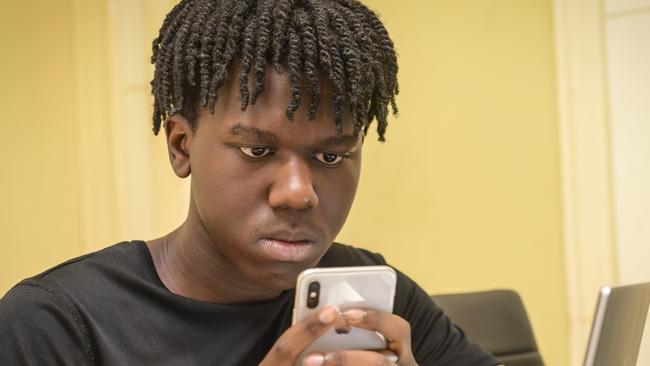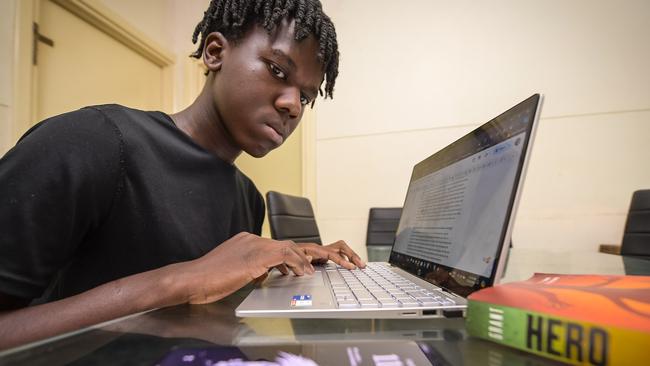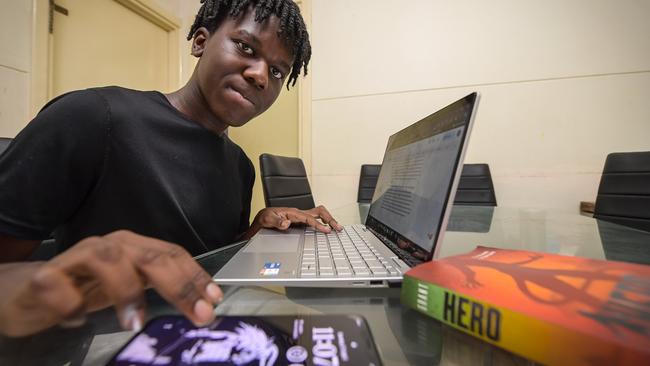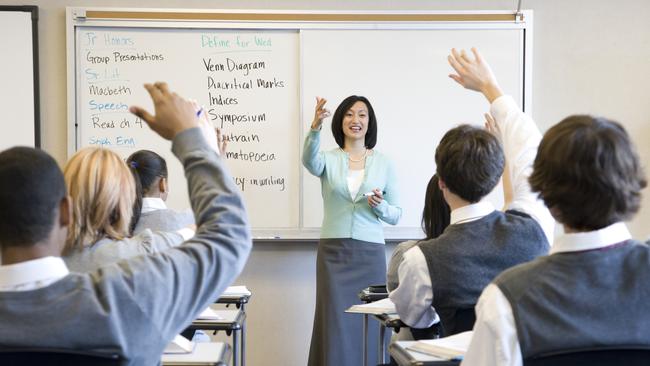Zombies in class: Teachers despair at phone addiction crisis as Year 11 student admits social media distracts from schoolwork
A veteran teacher says students addicted to social media are behaving like zombies or drug addicts in class, while Year 11 student James admits his phone is a constant distraction.
Education
Don't miss out on the headlines from Education. Followed categories will be added to My News.
Throughout his schooling, Year 11 student at Playford International College James Elias has developed a routine of getting his homework finished when he comes home from school.
The 16-year-old said he would start strong and make a 20-minute dent into his work but then described often becoming sidetracked by his phone.
“I feel as if, since I’ve done hard work, I should be able to reward myself with being able to scroll through my phone,” James said.
“What I thought a small break would be, turns into a pretty long one and then realisation kicks in.
“If something catches my attention I’ll be on there for a while, maybe an hour.”
James is among students whose schoolwork has suffered due to mobile phone distraction.
The teen said while in the moment he “does feel rewarded” by a break on social media sites, such as TikTok and Instagram, his school work suffers and at times he will need to stay up late to finish assignments.
“When I step back and look at it, it makes me feel very unproductive and that I haven’t done as much as I could have done if my phone was out of the picture,” the student said.
“It also definitely causes me to stay up later to finish my work due to lost time.”

James said the desire to scroll through social media kicks in “especially during the times when I need to be really focused”.
“Just by having it next to you or near you it tempts you to pick it up and go on it,” he said.
As a result of the impact on his work, the student has devised various strategies to keep him away from social media distraction.
Now, James will turn his phone off completely or leave it in another room so he can get study done for the night.
And Playford International College has made an attempt to eliminate the distraction at school after they joined a statewide phone ban in Term 3 of last year, but James said it is not always effective.
At his school, students are told to turn their phone off and leave it in their school bag and if they are spotted using their mobile device, it will be confiscated for the rest of the day.
“Sometimes they do get away with it but most of the time they get caught,” he said.
“I’ve also noticed that some other students are rebelling against it by going into spaces where teachers can’t see them or using it in class when they shouldn’t be.”
But overall, he said the phone ban was positive as he has “seen more people out on the oval playing with a ball” at recess and lunch.
“I have noticed that a few more students are starting to do their work rather than being on their phones,” James said.

The details of his experience come as a respected teacher of more than 30 years has lifted the lid on the devastating impacts of social media use, likening students to zombies or drug addicts who are high on speed.
Welcome to the two extremes – and shocking reality – of education today, as frustrated teachers grapple with the stranglehold social media has on children’s lives.
Jean Yates has taught in four top Queensland schools and has never seen a more compromised generation, plagued by psychological and behavioural problems fuelled by dependence on social media.
“They come to school tired and wired – they’re like zombies, completely out of it and falling asleep on the desk, or so hyper it’s like they’re on speed,” she said.
In an exclusive tell-all interview, Ms Yates reveals a raft of serious issues she says are not only damaging children’s ability to learn, but also defeating even the best teachers.
She pointed to short attention spans, desensitisation to violence, distraction and obsession as some of the biggest challenges.
She also noted social media had been instrumental in shifting priorities for the younger generation.

“Kids complain they don’t have time to do homework or assignments, but that’s because they’re on social media all night,” she said.
“And more kids have part-time jobs, working six-hour shifts every night, to pay for all those possessions social media is telling them to have – it’s a double-whammy.”
Ms Yates, 53, says educators are “losing control” as social media takes over the way students think and behave.
“It really does influence everything they do,” she said.
“What you say and what Kim Kardashian says could be worlds apart, but they’re more likely to listen to her.
“They’re seeing the beautiful people on social media and saying, ‘they’ve got it right, what would you know?’.”
Ms Yates has taught English since 1992 – at West Moreton Anglican College and St Edmund’s Catholic boys’ school in Ipswich, Somerset College on the Gold Coast and Ipswich Girls Grammar – and says all schools, private or state, face the same problems.
She says it is virtually impossible to “embed good values” because what children view online is “so convincing and they believe what they see”.

This extends to behaviour, which has become increasingly aggressive and dysfunctional.
“Kids are definitely more violent in the classroom and playground,” she said.
“Violence is all over social media, which makes it seem normal.”
Social media has also decimated attention spans.
“Kids want 24/7 stimulation and to be entertained – not everything you teach can be entertaining so they switch off,” Ms Yates said.
“Disengaged kids have always existed but now there are more of them.”
Earlier this month, Ms Yates called time on her classroom career.
She says it has become “impossible to control the impacts of social media within the school environment” and has joined a national cybersecurity firm, Cybernetic Shield, to help design and implement its school-based program to keep kids safe online.
“Schools are blamed for everything that goes wrong, but teachers need time and support,” she said.
“The government doesn’t have a clue – the minister for education is never a teacher – so you need people who aren’t completely disillusioned with teaching who can step into external roles and help teachers, instead of saying, ‘society is going to hell and it’s teachers’ fault’.”




